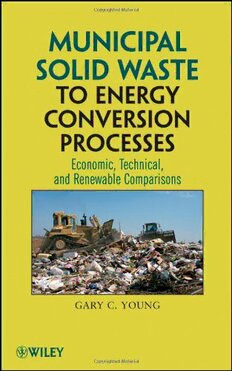
Municipal Solid Waste to Energy Conversion Processes: Economic, Technical, and Renewable Comparisons PDF
398 Pages·2010·3.747 MB·English
Most books are stored in the elastic cloud where traffic is expensive. For this reason, we have a limit on daily download.
Preview Municipal Solid Waste to Energy Conversion Processes: Economic, Technical, and Renewable Comparisons
Description:
A technical and economic review of emerging waste disposal technologiesIntended for a wide audience ranging from engineers and academics to decision-makers in both the public and private sectors, Municipal Solid Waste to Energy Conversion Processes: Economic, Technical, and Renewable Comparisons reviews the current state of the solid waste disposal industry. It details how the proven plasma gasification technology can be used to manage Municipal Solid Waste (MSW) and to generate energy and revenues for local communities in an environmentally safe manner with essentially no wastes.Beginning with an introduction to pyrolysis/gasification and combustion technologies, the book provides many case studies on various waste-to-energy (WTE) technologies and creates an economic and technical baseline from which all current and emerging WTE technologies could be compared and evaluated.Topics include:Pyrolysis/gasification technology, the most suitable and economically viable approach for the management of wastesCombustion technologyOther renewable energy resources including wind and hydroelectric energyPlasma economicsCash flows as a revenue source for waste solids-to-energy managementPlant operations, with an independent case study of Eco-Valley plant in Utashinai, JapanExtensive case studies of garbage to liquid fuels, wastes to electricity, and wastes to power ethanol plants illustrate how currently generated MSW and past wastes in landfills can be processed with proven plasma gasification technology to eliminate air and water pollution from landfills.
See more
The list of books you might like
Most books are stored in the elastic cloud where traffic is expensive. For this reason, we have a limit on daily download.
